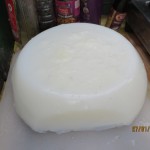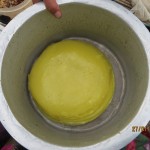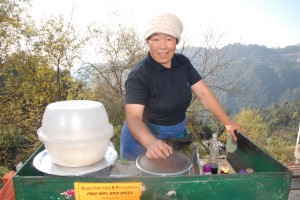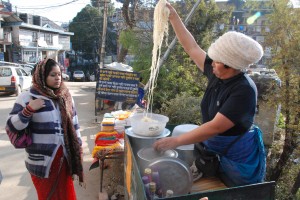Wendhe: I see this Tibetan woman almost every day, standing on the road side. She will smile as we greet each other and always offer me laphing*. I, one of her regular customers, asked her few questions and her answers tell her story. Besides being one of her regular customers, the story teller in me wanted to know more about her. Here is her story.
Tenzin Tsomo: My name is Tenzin Tsomo. I came to India in 2008 around Losar (Tibetan New Year) time. I was on the way to Nepal when the 2008 uprising was happening in Lhasa. After reaching Dharamshala, I went to the Tibetan Transit School for nearly a month. I left the school because I could not learn or understand anything. I am a rat by Tibetan horoscope so that means I am 45 years old now which means I was around 39 when I came to India. So I was too old to start school. I had never been to school before coming to exile. In Tibet, my family are nomadic farmers. We have around a dozen domestic animals like yaks, sheep and pigs.
The thing I miss most about Tibet is my family. I don’t have any relatives in India. So after leaving school, I worked in a restaurant. I met my husband there. He was a driver and I washed dishes. After some time my husband got Tuberculosis and had to leave his job. We had a baby and he was just one year old at that time. I had to look after my son and husband as well as work. That was the most difficult time I have experienced since coming here. My family sent some money at that time but they cannot send it forever so I had to sell laphing to support my family here. I also couldn’t work under other people because they look down upon you. I went on to run my own laphing business.
Life in exile is difficult especially when you don’t know any languages (Hindi and English) and you are illiterate. I was a student at Lha also. My friend told me that I should try to learn something and I joined Lha classes but I could not continue as I have to sell laphing as well as do other work. When there are many people in McLeod Ganj, I wake up to make laphing for the day at around one or two o’clock in the morning and when there are not so many people, I wake up at around four o’clock. I sell laphing until everything is sold, or until around seven in the evening. Then I have to cook dinner, bath my son and do housework.
 Selling laphing at the road side is not easy. Whether you have any business or not, you have to stand by the road in the dust, in rain or in heat. It is better when it is sunny. I sell laphing every day of the week. When I am sick or if I have much work at home, then I don’t sell laphing. If I don’t sell laphing we won’t have money. I have to pay rent, look after three people including myself, and pay for my son’s school fees. I earn just enough money for our daily expenses.
Selling laphing at the road side is not easy. Whether you have any business or not, you have to stand by the road in the dust, in rain or in heat. It is better when it is sunny. I sell laphing every day of the week. When I am sick or if I have much work at home, then I don’t sell laphing. If I don’t sell laphing we won’t have money. I have to pay rent, look after three people including myself, and pay for my son’s school fees. I earn just enough money for our daily expenses.
I feel very happy when business is good but when it is not, sometimes I feel very sad. When there are teachings then business is good. It is Gyalwa Rinpoche’s [His Holiness the Dalai Lama] grace that so many people come here to his teachings. My happiest moment in exile was when I had an audience with His Holiness just after I reached India.
My son goes to the Tibetan Peteon School. He is five years old and he is in the kindergarden now. I want my son to study well. I want him to become a doctor, like my father. My father is dead now but he was a doctor in Tibet. My son is learning Tibetan very well. His teachers are very good and I am very thankful to them. He is even learning the Tibetan honorific language. I don’t know Tibetan honorifics well but he can correct me and teach me. He has become my teacher! [Wendhe: She said this with a big, proud smile on her face] I will keep selling laphing as long as they allow me to stay on the roadside and I will see my son grow up to become a well-educated person.
*Laphing is a Tibetan delicacy made of cornflour (white laphing) or wheat-flour (yellow laphing) that is cooked. Once cooled, it is mixed with spices and soybean sauce and served.







 Print
Print Email
Email













